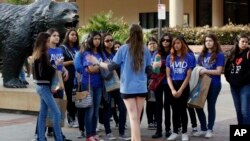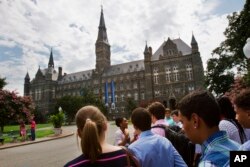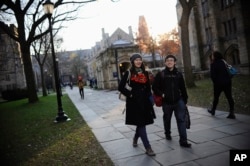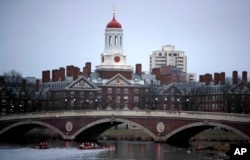Student Union
How to Untie the Knots of College Applications

College fees are expensive, but they’re not supposed to be this pricey.
Dozens of wealthy parents in the U.S. were indicted this week for illegally paying up to millions of dollars to buy a place for their children at prestigious universities. The scandal has pulled back the curtain on a process that has often frustrated applicants and their families pursuing higher education. Trying to wrap your arms around it is like trying to catch fog.
So what do students need to do to get accepted into U.S. colleges and universities?
Don’t wait until your senior year of high school to prepare for college. The first steps start freshman year. Grade-point averages, or GPAs — which carry the most weight in acceptance — start being calculated the first day of a student’s freshman year.
Most schools require applicants to submit an official transcript of coursework from her or his secondary school. The transcript includes the student's GPA, which is determined by a calculating the value of a letter grade with the number of course credits. A 4.0 GPA is considered the highest ... sort of. High-achievers who take additional classes or college courses can bump up their GPA to above a 4.0 if they earn top grades.
According to Prepscholar.com, the average GPA for Yale applicants is 4.12, at the University of California, it's 3.73, and at the U.S. Naval Academy, which does not charge tuition and is known for its academic excellence, it's 3.94.
Nothing guaranteed
Parents who are financially able can send their child to an independent, private or boarding school that can funnel the student into a system that offers guidance, connections, rigorous academics and testing assistance. Some college counselors, however, caution that children who come through an exceptional public or private secondary school might not distinguish themselves as much as a child who emerges as an exceptional student from an average or below-average high school.
Grades, however, do not guarantee entrance. Most colleges and universities use what’s called a holistic approach to assembling a freshman class of new college students, taking into consideration abilities and skills such as athletic participation, creativity, leadership and innovation. Colleges assemble a freshman class much like an orchestra: An applicant might be the best flautist in the world, but the school orchestra might need a French horn player.
Admission officers look for applicants who have the discipline to get up early every morning to practice swimming or another sport. They look for students who can lead others, not by force but by example and persuasion, in athletics, student government and service. They look for service to community that can be verified by mentors or others who can affirm the effort was reality, not just an exercise written on paper.
While not everyone needs to write an exemplary essay — STEM students, for example, need more to write in numerical or coding language — those personal statements show character. A student who wrote about the effect a parents’ divorce had on them used to get an admission officer’s attention. But today, having cared for an ailing or older family member is a more popular topic.
For a fee, many private agencies and tutors are available to help students prepare their application. But advice and guidance from U.S. colleges and universities can be found for free online as well.
But that, too, might not be enough or might not be the “right fit,” an expression that guidance counselors and admission officers explain to hopeful applicants and their families over and over.
“Many talented, accomplished young people who will be outstanding leaders in the future will not make it to the likes of Harvard, Stanford and Yale,” wrote Natasha Warikoo, associate professor of education at Harvard. “There simply are not enough places for all of them at those universities.”
“So looking for explanations for why you did get in or whether some groups are favored over others misses the broader picture of the lack of clarity on what gets anyone into elite colleges,” Warikoo wrote.
Applicants are encouraged to study an institution’s course catalog and department to see the skills of professors and programs.
If an applicant wants to study international relations, study abroad programs are an important consideration. If an applicant wants to study engineering, she or he should apply to engineering schools that offer their desired discipline: computer, mechanical, civil, chemical, aerospace or petroleum.
Many parents say interviewing with an admissions counselor from a preferred school is a popular strategy. That way, the applicant gets to impress an admissions counselor with personality, questions and answers in a face-to-face meet. It shows a school you are interested enough to go beyond a college tour. Tip: A common question from a college officer is, “What books do you like to read.” Be prepared.
Explainer: College Admissions
Applying from abroad
International students who apply from overseas can access assistance and guidance for free from 425 student advising centers through the U.S. State Department’s EducationUSA offices at consulates and embassies in more than 175 countries.
EducationUSA will demystify the application process and help arrange admission to U.S. schools. It will explain and counsel applicants about the admissions process and standardized testing requirements, how to finance a U.S. education, the student visa process, and preparing for departing to the U.S. It organizes school visits and college fairs, virtual and on location; shares information about scholarship programs, and connects applicants with U.S. and foreign institutions, according to its website.
One final word from Drew Gilpin Faust, the first woman president of Harvard University, who spoke at the Aspen Ideas Festival in 2014.
“We could fill our class twice over with valedictorians,” she explained. “So we look for other kinds of characteristics, as well. Character is another one. Those recommendations from teachers, employers, who this person is matters a lot because that’s going to say how they are going to interact in our community.
“We also look for people who are going to be interesting, interesting members of the community to which they contribute. A combination of what they can take and what they can give. So I would say, make your children interesting. Or encourage them to follow their passions and their directions that will excite them, and therefore, excite us," Faust said.
Asked by David Rubenstein, who founded the private-equity firm Carlyle Group: “If somebody is a valedictorian, perfect scores on their SATs, captain of the football team, president of student government, are they guaranteed to get in?”
Please share your thoughts in the Comments below, and visit us on Facebook, Twitter, Instagram and LinkedIn.
See all News Updates of the Day
- By VOA News
Competition grows for international students eyeing Yale

It’s tough to gain admission to Yale University, and it’s getting even tougher for international students as standout students from around the world set their sights on Yale.
The Yale Dale News, the campus newspaper, takes a look at the situation here.
- By VOA News
Student from Ethiopia says Whitman College culture made it easy to settle in

Ruth Chane, a computer science major from Ethiopia, writes about her experiences settling into student life at Whitman College in the U.S. state of Washington.
"The community at Whitman College made sure I felt welcomed even before I stepped foot on campus," she says.
- By VOA News
Claremont Colleges student gets a shock when she heads home to Shanghai

In The Student Life, the student newspaper for the Claremont Colleges, a consortium of five liberal art colleges and two graduate schools in Claremont, California, student Rochelle Lu writes about readjusting to her Shanghai home after spending a semester in the United States.
- By VOA News
Cedarville University aims to ease transition for international students

Cedarville University in the U.S. state of Ohio says it’s got more than 140 international students representing 44 countries.
Here, the school interviews Jonathan Sutton, director of international student services. He talks about his job and the opportunities for international students on campus.
- By VOA News
Morehouse College offers prospective students tips on applying and thriving

Morehouse College, a private, historically Black liberal arts college in the U.S. state of Georgia, offers a guide for international students interested in attending the school.
Among the tips to apply and thrive at Morehouse:
- Take advantage of the school’s orientation program
- Turn to the school’s Center for Academic Success for tutoring, support and more
- Immerse yourself in campus life via clubs and societies
- By Reuters
US reviews Columbia University contracts, grants over antisemitism allegations

The administration of President Donald Trump said on Monday it will review Columbia University's federal contracts and grants over allegations of antisemitism, which it says the educational institution has shown inaction in tackling.
Rights advocates note rising antisemitism, Islamophobia and anti-Arab bias since U.S. ally Israel's devastating military assault on Gaza began after Palestinian Hamas militants' deadly October 2023 attack.
The Justice Department said a month ago it formed a task force to fight antisemitism. The U.S. Departments of Health and Education and the General Services Administration jointly made the review announcement on Monday.
"The Federal Government's Task Force to Combat Anti-Semitism is considering Stop Work Orders for $51.4 million in contracts between Columbia University and the Federal Government," the joint statement said.
The agencies said no contracting actions had been taken yet.
"The task force will also conduct a comprehensive review of the more than $5 billion in federal grant commitments to Columbia University."
The agencies did not respond to requests for comment on whether there were similar reviews over allegations of Islamophobia and anti-Arab bias.
Columbia had no immediate comment. It previously said it made efforts to tackle antisemitism.
College protests
Trump has signed an executive order to combat antisemitism and pledged to deport non-citizen college students and others who took part in pro-Palestinian protests.
Columbia was at the center of college protests in which demonstrators demanded an end to U.S. support for Israel due to the humanitarian crisis caused by Israel's assault on Gaza. There were allegations of antisemitism and Islamophobia in protests and counter-protests.
During last summer's demonstrations around the country, classes were canceled, some university administrators resigned and student protesters were suspended and arrested.
While the intensity of protests has decreased in recent months, there were some demonstrations last week in New York after the expulsion of two students at Columbia University-affiliated Barnard College and after New York Governor Kathy Hochul ordered the removal of a Palestinian studies job listing at Hunter College.
A third student at Barnard College has since been expelled, this one related to the occupation of the Hamilton Hall building at Columbia last year.
Canada’s immigration overhaul signals global shift in student migration
From Europe to North America, nations are tightening their immigration policies. Now Canada, long seen as one of the world's most welcoming nations, has introduced sweeping changes affecting international students. The reforms highlight a growing global trend toward more restrictive immigration policies. Arzouma Kompaore reports from Calgary.
Trump administration opens antisemitism inquiries at 5 colleges, including Columbia and Berkeley

The Trump administration is opening new investigations into allegations of antisemitism at five U.S. universities including Columbia and the University of California, Berkeley, the Education Department announced Monday.
It's part of President Donald Trump's promise to take a tougher stance against campus antisemitism and deal out harsher penalties than the Biden administration, which settled a flurry of cases with universities in its final weeks. It comes the same day the Justice Department announced a new task force to root out antisemitism on college campuses.
In an order signed last week, Trump called for aggressive action to fight anti-Jewish bias on campuses, including the deportation of foreign students who have participated in pro-Palestinian protests.
Along with Columbia and Berkeley, the department is now investigating the University of Minnesota, Northwestern University and Portland State University. The cases were opened using the department's power to launch its own civil rights reviews, unlike the majority of investigations, which stem from complaints.
Messages seeking comment were left with all five universities.
A statement from the Education Department criticized colleges for tolerating antisemitism after Hamas' Oct. 7, 2023, attack on Israel and a wave of pro-Palestinian protests that followed. It also criticized the Biden administration for negotiating "toothless" resolutions that failed to hold schools accountable.
"Today, the Department is putting universities, colleges, and K-12 schools on notice: this administration will not tolerate continued institutional indifference to the wellbeing of Jewish students on American campuses," said Craig Trainor, the agency's acting assistant secretary for civil rights.
The department didn't provide details about the inquiries or how it decided which schools are being targeted. Presidents of Columbia and Northwestern were among those called to testify on Capitol Hill last year as Republicans sought accountability for allegations of antisemitism. The hearings contributed to the resignation of multiple university presidents, including Columbia's Minouche Shafik.
An October report from House Republicans accused Columbia of failing to punish pro-Palestinian students who took over a campus building, and it called Northwestern's negotiations with student protesters a "stunning capitulation."
House Republicans applauded the new investigations. Representative Tim Walberg, chair of the Education and Workforce Committee, said he was "glad that we finally have an administration who is taking action to protect Jewish students."
Trump's order also calls for a full review of antisemitism complaints filed with the Education Department since Oct. 7, 2023, including pending and resolved cases from the Biden administration. It encourages the Justice Department to take action to enforce civil rights laws.
Last week's order drew backlash from civil rights groups who said it violated First Amendment rights that protect political speech.
The new task force announced Monday includes the Justice and Education departments along with Health and Human Services.
"The Department takes seriously our responsibility to eradicate this hatred wherever it is found," said Leo Terrell, assistant attorney general for civil rights. "The Task Force to Combat Anti-Semitism is the first step in giving life to President Trump's renewed commitment to ending anti-Semitism in our schools."
- By VOA News
STEM, business top subjects for international students

The Times of India breaks down the most popular subjects for international students to study in the U.S.
STEM and business lead the pack. Read the full story here. (January 2025)
- By VOA News
Safety and visa difficulties among misconceptions about US colleges

U.S. News & World report addresses some of the misconceptions about U.S. colleges and universities, including the difficulty of getting a visa.
Read the full story here. (January 2025)
- By VOA News
Work opportunities help draw international students to US schools

US News & World Report details the three top factors in foreign students' decision to study in the U.S. They include research opportunities and the reputation of U.S. degrees. Read the full story here. (December 2024)
- By VOA News
British student talks about her culture shock in Ohio

A British student who did a year abroad at Bowling Green State University in Ohio talks about adjusting to life in America in a TikTok video, Newsweek magazine reports.
Among the biggest surprises? Portion sizes, jaywalking laws and dorm room beds.
Read the full story here. (December 2024)
- By VOA News
Harvard's Chan School tells international students what to expect

Harvard's T.H. Chan School of Public Health reaches out to international students by detailing the international student experience at the school.
Learn more about housing, life in Boston and more here.
- By Reuters
China unveils plan to build 'strong education nation' by 2035

China issued its first national action plan to build a "strong education nation" by 2035, which it said would help coordinate its education development, improve efficiencies in innovation and build a "strong country."
The plan, issued Sunday by the Communist Party's central committee and the State Council, aims to establish a "high quality education system" with accessibility and quality "among the best in the world."
The announcement was made after data on Friday showed China's population fell for a third consecutive year in 2024, with the number of deaths outpacing a slight increase in births, and experts cautioning that the downturn will worsen in the coming years.
High childcare and education costs have been a key factor for many young Chinese opting out of having children, at a time when many face uncertainty over their job prospects amid sluggish economic growth.
"By 2035, an education power will be built," the official Xinhua news agency said, adding that China would explore gradually expanding the scope of free education, increase "high-quality" undergraduate enrolment, expand postgraduate education, and raise the proportion of doctoral students.
The plan aims to promote "healthy growth and all-round development of students," making sure primary and secondary school students have at least two hours of physical activity daily, to effectively control the myopia, or nearsightedness, and obesity rates.
"Popularizing" mental health education and establishing a national student mental health monitoring and early warning system would also be implemented, it said.
It also aims to narrow the gap between urban and rural areas to improve the operating conditions of small-scale rural schools and improve the care system for children with disabilities and those belonging to agricultural migrant populations.
The plan also aims to steadily increase the supply of kindergarten places and the accessibility of preschool education.
- By VOA News
A look at financial aid options for international graduate students in US

The Open Notebook, a site focusing on educating journalists who cover science, has complied a list of U.S. graduate program financial aid information for international students.










